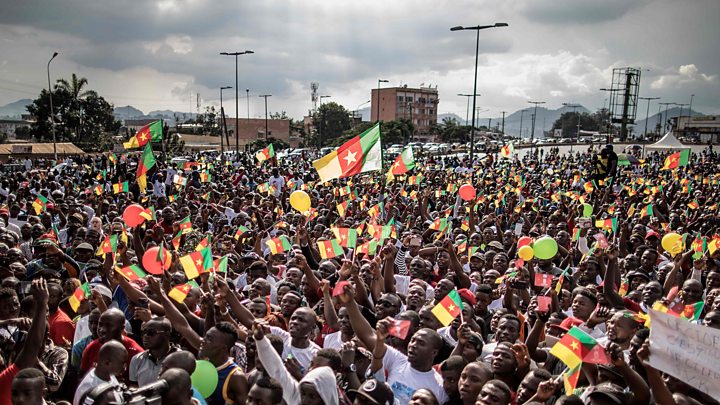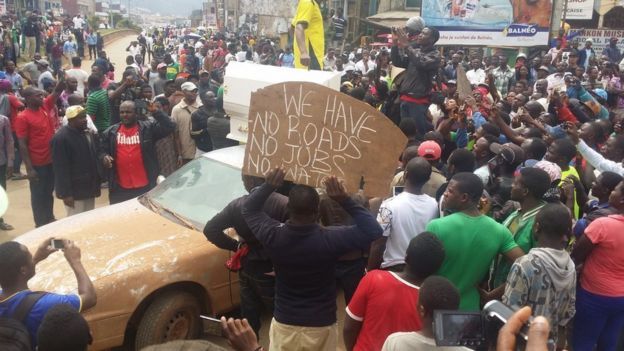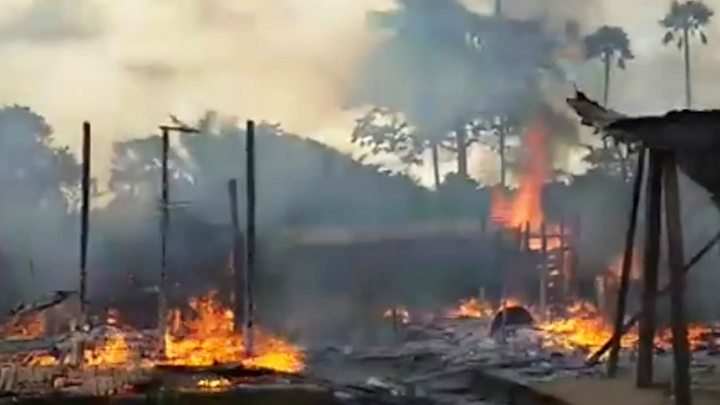Cameroon's Anglophone Crisis: Red Dragons and Tigers - The Rebels Fighting For Independence
The Red Dragons, Tigers and Ambazonia Defence Forces (ADF) - these are just some of the armed groups which have sprung up to fight for independence in English-speaking parts of Cameroon, posing a major security threat to Sunday's elections, in which President Paul Biya, 85, is seeking to extend his 36-year rule.
In the absence of reliable opinion polls, it is impossible to gauge the level of their support but the authorities' brutal crackdown has only pushed more of the local population into the arms of the separatists, analysts say.
The militias, formed in the past 12 months, have made many small towns and villages in the two main Anglophone regions, the North-West and South-West, "ungovernable", something unimaginable just a few years ago, Nigeria-based Cameroon analyst Nna-Emeka Okereke told the BBC.
"They probably have 500 to 1,000 active fighters, but more importantly they have the morale and determination to fight for the independence of what they call Ambazonia state," he said.

Media captionCameroon election: Five things to know ahead of 7 October
The militias have repulsed attempts by the powerful Cameroonian army, including its elite US-trained troops, to defeat them because of the support they command in the two regions, Mr Okereke said.
"Women will cook for them, share information with them on troop movement and, in at least one instance, even helped lure a soldier to his death in Manyu Division [in the South-West]," Mr Okereke said.
'Proud of Anglophone heritage'
The militias began to emerge in 2017 after a security force crackdown on mass protests, led by lawyers in wigs and teachers in suits, over the government's alleged failure to give enough recognition to the English legal and education systems in the North-West and South-West.
The government was accused of relying heavily on people trained in the French legal and educational tradition to work in key posts and generally marginalising Cameroon's English-speaking minority, who make up about 20% of the population.
After some groups declared independence on 1 October 2017, the government dismissed the armed groups as "terrorists", and state radio reported that Mr Biya "declared war" on them.
"People in these regions are proud of their Anglophone heritage - especially their legal and education institutions. So it was a campaign for greater political and civil rights, and the separatists were seen as very marginal. But the government intervened in a heavy-handed way and that stirred support for the militants," Francophone Africa analyst at the UK-based Chatham House think-tank, Paul Melly, told the BBC.
 Many English-speaking People Complain Of Being Treated Like Second-class Citizens
Many English-speaking People Complain Of Being Treated Like Second-class CitizensLocals say this happened in many areas, including the farming town of Bafut, where soldiers were accused of carrying out random attacks, even torching the motorcycle taxis of young men.
'Classic rural insurgency'
With their source of income destroyed, the taxi operators made the town a no-go area for the government by forming the Seven Karta militia - "karta" refers to a famous cloth worn by people in the area and "seven" to a group of men who, legend has it, were known for their strength during the colonial era.
Rights group Amnesty International said the militants have also committed atrocities.
Apart from killing members of the security forces, they have also carried out attacks "designed to strike fear amongst the population, going as far as burning down schools and targeting teachers who did not enforce the boycott", Amnesty said in a report.
 |
| Cameroon's Anglophone Crisis: Red Dragons and Tigers - The Rebels Fighting For Independence |
The International Crisis Group (ICG) think-tank estimates that around 10 armed separatist groups exist, gaining control of a "significant proportion of rural areas and main roads" in the North-West and South-West regions.
"They are not operating under one broad front, but there is very likely to be co-ordination between political elements in exile," ICG Cameroon analyst Richard Moncrieff told the BBC.
"They are waging a classic rural insurgency. They don't control territory all the time. They move around. They use hit-and-run tactics against isolated units of the security forces or prestigious targets - like local chiefs, whom they kidnap," Mr Moncrieff told the BBC.
Mr Okereke said he believed that the Ambazonia Self-Defence Council (ASDC), which is also known as the Ambazonia Restoration Forces (ARF), is the largest armed group, incorporating smaller militias like the Seven Karta, the Red Dragons and the Tigers.









Post a Comment